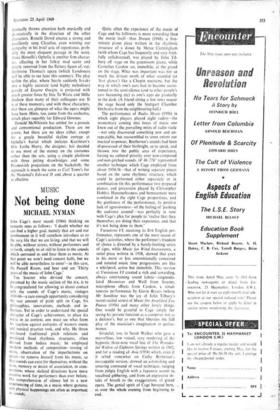- Dumb show
OPERA JOHN HIGGINS
Introducing his opera Hamlet to the Friends of Covent Garden some ten days ago, Humphrey Searle remarked that he had been considering setting a Shakespeare text for some time. His first choice was Antony and Cleo- patra, then came news that Samuel Barber had hit on the same notion and was well ad- vanced on the project. So the switch was made to Hamlet. Rolf Liebermann commissioned it for his Hamburg company and it was first seen in that town just over a year ago.
The anecdote surely has a moral: if Hamlet is your reserve rather than your number one selection, think twice before playing him. If anything new is to be said, then tremendous dedication and enthusiasm are needed. Both these qualities, for example, blaze through the current Roundhouse production : Tony Richardson and Nicol Williamson met in the Mediterranean last summer and decided that this was simply the only play they wanted to put on in London, and the force of the agree- ment is seen in the force of the performance.
By contrast, there is a second-best feeling about Searle's Hamlet at Covent Garden. The ••
production is second-best, the sets are second- best and, if it is permissible to judge after two hearings, so is much of the music. The result is rather glummer than the respectful applause which greeted the London premiere last Fri-
day would suggest. It is not merely that this Hamlet is less inspired and inspiring than it should have been, but that it holds up the operatic traffic; ponder, for instance, the fact that the first London performance of o Henze's Der :lunge Lord will be given next Octot, ber at Sadler's Wells by the Cologne Staters:: Opera, which the Germans will admit is notiss one of the strongest companies in Europe.
What ultimately destroys this Hamlet is the lack of a viewpoint, the absence of any intense personal vision of the work. The play has been, discreetly trimmed—perhaps edited is the cor- ' rect word—without any of the oversimplifica- tion a librettist working fifty years ago would have had to resort to. There are a great num- ber of words, most of them carefully articu- lated—the libretto when it is published may well be of Meistersinger length, though the opera has but two and a half hours of music. Yet all this diligence fails to spark any new ex- perience of the play. It is not a Hamlet of our times, or of anybody else's for that matter.
Victor Braun, a good-looking young Canadian baritone from the Munich Opera who certainly appears to carry no more than Hamlet's thirty years, has a clear, well-moulded voice. Heocarries himself proudly and uses hie sword adroitly; but the mind's the thing and this is in short supply. 'To be or not to be,' which forms the very kernel of the opera, is perfunctory. The doubts of conscience and the racks of decision-making are sacrificed to a simple revenger's tragedy of a man who gradu- ally finds out how and why his father died. Hamlet's wit, with mockery as its most effective weapon (which Williamson and, to a lesser ex- tent, David Warner before 'him demonstrated so forcefully), is missing. On stage there is simply an operatic baritone, handsome and with a far better voice than most. .
This lack of a firm personality in Hamlet ironically throws attention both musically and dramatically in the direction of the other characters. Ronald Dowd creates a_strong and excellently sung Claudius, even winning our sympathy in his brief aria of repentance, prob- ably the most eloquent passage in the score. Anna Howells's Ophelia is another firm charac- ter, affecting in her folksy mad scene and utterly removed from the fluttery figure of, say, Ambroise Thomas's opera (which Londoners will be able to see later this summer). The play within the play, where Searle suddenly breaks into a highly accurate (and highly melodious) parody of Eugene Onegin, is projected with much greater force by Inia Te Wiata and Milla Andrew than many of their colleagues use. It is at these moments, and with these characters, that there are glimpses of-what the opera might have been. Hints, too, come from the orchestra, which plays superbly for Edward Downes.
Donald McWhinnie has settled for a prosaic and conventional production. There are no errors; but there are no ideas either, except for a greyly beautiful skyline cortege at Ophelia's burial which imitates Kozintsev's film. Leslie Hurry, the designer, hal decided to use most of the money on the costumes rather than the sets, using a simple platform with three jutting 'drawbridges and some Piranesi-ish projections on the backcloth; the approach is much the same as Carl Toms's for the National's Edward ll and about a quarter as effective.











































 Previous page
Previous page